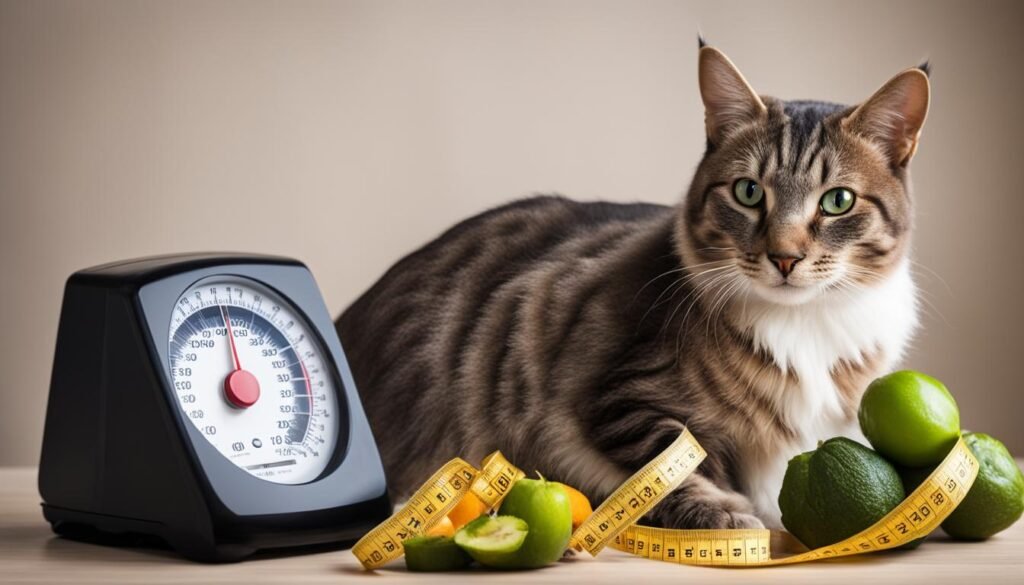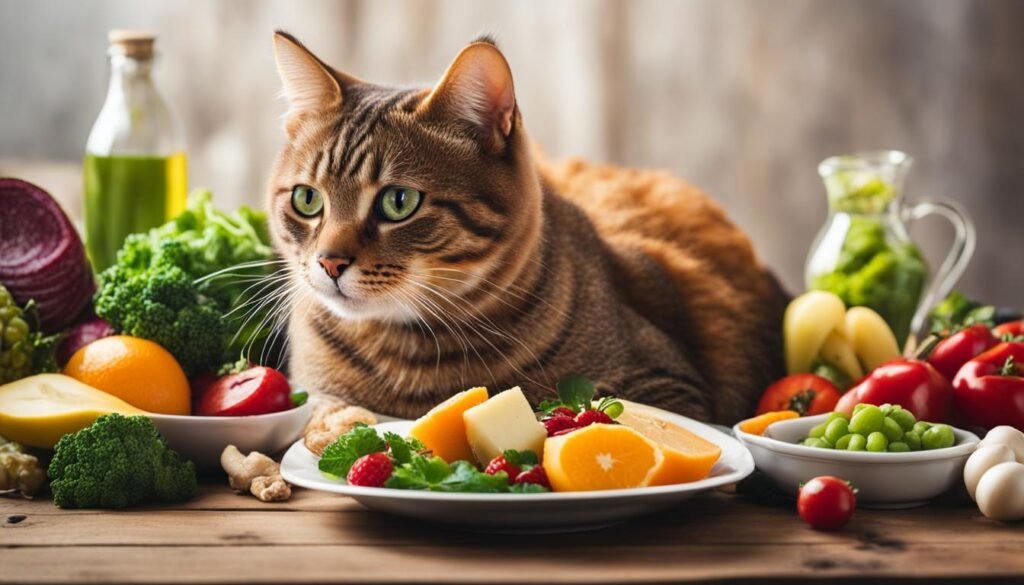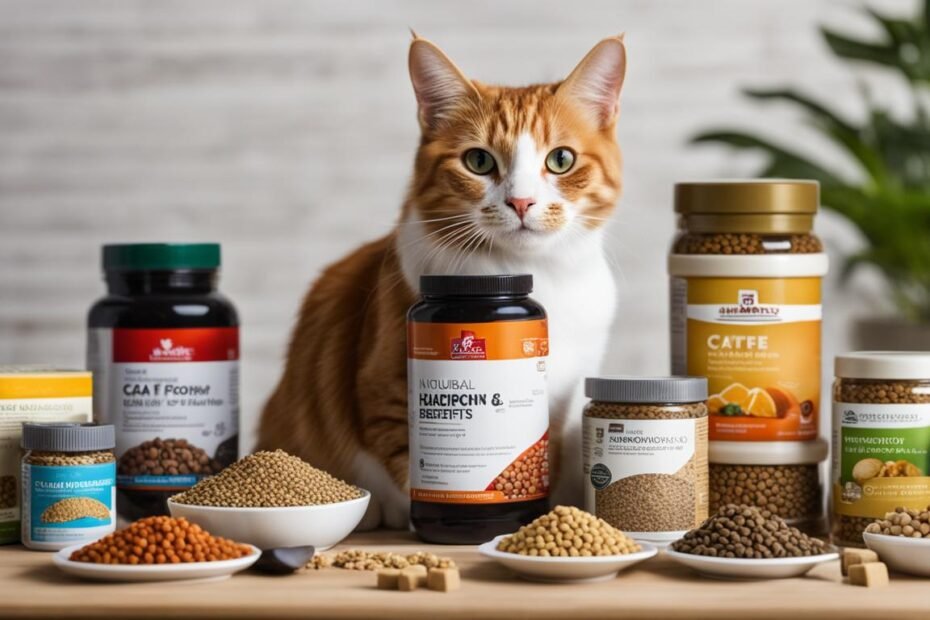Proper cat nutrition is crucial for the health and well-being of our feline friends. Cats are obligate carnivores and require a diet that is high in animal-based proteins. They also need specific nutrients like taurine for heart health. Feeding high-quality commercial cat food that meets the standards set by AAFCO is recommended. Additionally, cats need access to fresh water to stay hydrated.
Key Takeaways:
- Cats are obligate carnivores and need a diet high in animal-based proteins.
- Feeding high-quality commercial cat food that meets AAFCO standards is recommended.
- Cats require specific nutrients like taurine for heart health.
- Providing fresh water is essential for cat hydration.
- Consulting with a veterinarian can provide guidance on cat nutrition management.
Understanding the Nutritional Requirements of Cats
When it comes to the nutritional needs of cats, it’s important to understand that they have unique requirements compared to other animals. Cats are obligate carnivores, which means they require a diet that is rich in animal proteins to thrive. Unlike dogs or humans, they cannot obtain essential nutrients from plant-based sources alone. This is why feeding cats a diet that is high in animal-based proteins is crucial for their overall health and well-being.
In addition to animal proteins, cats also require specific nutrients that are essential for their optimal health. One such nutrient is taurine, which is vital for heart health. Unlike humans and dogs, cats cannot produce adequate amounts of taurine on their own, making it necessary to include in their diet. Feeding your cat high-quality commercial cat food that meets the standards set by the Association of American Feed Control Officials (AAFCO) is recommended, as it ensures that your cat’s nutritional needs are being met.
It’s also important to consider that cats’ nutritional requirements may vary depending on their stage of life. Kittens, for example, require more calcium and protein for growth, while senior cats may benefit from specific nutrient adjustments to support their aging bodies. Consulting with a veterinarian is essential to ensure that your cat is receiving the appropriate nutrition at each life stage.
Key Points:
- Cats are obligate carnivores and require a diet that is high in animal proteins.
- They need specific nutrients like taurine for heart health.
- Feeding high-quality commercial cat food that meets AAFCO standards is recommended.
- Cats may have special dietary needs depending on their life stage, and consulting with a veterinarian is important.
| Nutrients | Importance | Sources |
|---|---|---|
| Animal Proteins | Crucial for overall health and development | Meat, poultry, fish, eggs |
| Taurine | Vital for heart health | Meat, fish, shellfish |
| Calcium | Essential for bone growth and strength | Dairy products, fish with bones, supplements |
| Omega-3 Fatty Acids | Supports healthy skin, coat, and immune system | Salmon, sardines, flaxseed |
| Vitamins and Minerals | Various functions, including immune support and energy production | Fruits, vegetables, supplements |
Signs and Symptoms of Poor Cat Nutrition
Poor cat nutrition can have detrimental effects on a cat’s overall health and well-being. It is important for cat owners to be aware of the signs and symptoms that may indicate inadequate nutrition. By recognizing these signs early on, prompt action can be taken to address any underlying issues and improve the cat’s diet.
Recognizing the signs
There are several indicators that may suggest poor cat nutrition. These signs include:
- Dull or unkempt coat
- Urinary issues
- Diarrhea
- Frequent vomiting
- Skin disorders
- Hair loss
It is important to note that these symptoms can also be associated with other health problems, so it is essential to consult a veterinarian if any concerning symptoms persist.
Common food allergies in cats
Food allergies are relatively rare in cats, but they can occur. Some common food allergens for cats include seafood, chicken, and beef. If a cat is experiencing symptoms such as vomiting, chronic diarrhea, skin problems, itchiness, or hair loss, it may be worth considering a vet-supervised food trial using a hypoallergenic diet.
| Allergen | Symptoms |
|---|---|
| Seafood | Vomiting, diarrhea, skin problems |
| Chicken | Vomiting, diarrhea, skin problems |
| Beef | Vomiting, diarrhea, skin problems |
Proper nutrition is key to keeping cats healthy and happy. Monitoring their diet and addressing any signs of poor nutrition or food allergies can significantly improve their overall well-being. Consultation with a veterinarian is crucial in identifying and managing these issues.
Maintaining a Healthy Weight in Cats
Maintaining a healthy weight is essential for cats to prevent obesity-related health issues. Just like in humans, overfeeding can lead to weight gain and put cats at risk for conditions such as diabetes, heart disease, and joint problems. Conversely, underfeeding can result in malnutrition and a weakened immune system. As responsible cat owners, it is our duty to ensure that our furry friends maintain a healthy weight through proper nutrition and portion control.
So, how do we go about maintaining a healthy weight in our cats? The first step is to monitor their weight regularly. This can be done by simply weighing them at home or taking them for regular check-ups at the veterinarian’s office. Knowing their weight allows us to determine the appropriate portion sizes and make adjustments if necessary.
Feeding guidelines for cats vary depending on factors such as age, weight, body condition, and activity level. Consulting with a veterinarian is crucial to determine the ideal portion sizes for your cat. They can guide you on the amount of food to feed and help you choose a cat food that is specifically formulated for weight management, if needed.
| Feeding Guidelines for Maintaining a Healthy Weight in Cats |
|---|
| Monitor your cat’s weight regularly |
| Consult with a veterinarian to determine portion sizes |
| Choose a cat food formulated for weight management |
| Avoid free-feeding and establish a regular feeding schedule |
| Provide enrichment during mealtimes to prevent overeating |
In addition to proper portion control, it is important to establish a regular feeding schedule and avoid free-feeding. This means providing two to three small meals per day for adult cats and more frequent meals for kittens. By sticking to a schedule, we can prevent cats from overeating and help them maintain a healthy weight.
Furthermore, providing enrichment during mealtimes can make the feeding experience more engaging and prevent cats from eating too quickly. Food puzzles, interactive feeders, and hiding small portions of food around the house are great ways to stimulate their natural hunting instincts and encourage slower, more mindful eating.

The Benefits of Maintaining a Healthy Weight
Maintaining a healthy weight in cats offers numerous benefits. Cats at a healthy weight are less likely to develop obesity-related health issues, such as diabetes, arthritis, and heart disease. They have more energy, are agile, and can enjoy an active lifestyle. Additionally, a healthy weight improves their overall quality of life and increases their lifespan.
In conclusion, maintaining a healthy weight in cats is crucial for their overall well-being. By monitoring their weight, following proper feeding guidelines, and providing enrichment during mealtimes, we can help our feline friends maintain a healthy weight and prevent obesity-related health issues. Remember to consult with a veterinarian for personalized advice and guidance on maintaining your cat’s weight.
Feeding Guidelines and Best Practices for Cats
When it comes to feeding your cat, following proper guidelines and best practices is essential for their overall health and well-being. Here are some key recommendations to ensure your feline friend receives the nutrition they need:
- Provide 2-3 small meals per day for adult cats. This helps regulate their metabolism and prevents overeating.
- Adjust portion sizes based on your cat’s age, weight, and activity level. Consult with your veterinarian for personalized recommendations.
- Incorporate a variety of high-quality cat food options into their diet. Dry cat food is a staple but consider adding wet food for added hydration.
- Establish a regular feeding schedule to prevent free-feeding and maintain portion control.
- Consider using food puzzles or hiding small portions of food around the house to provide mental stimulation during mealtime.
Remember, each cat is unique, and their nutritional needs may vary. It’s always recommended to consult with your veterinarian for specific feeding guidelines based on your cat’s individual requirements. By following these best practices and providing a balanced diet, you can ensure your cat stays healthy and happy for years to come.
“Proper nutrition is the foundation of a cat’s well-being. By following feeding guidelines, you are providing them with the necessary nutrients to thrive.” – Dr. Emily Thompson, DVM
Table: Cat Food Types
| Food Type | Description |
|---|---|
| Dry Cat Food | A convenient option that helps promote dental health and is often nutritionally balanced. |
| Wet Cat Food | Contains higher moisture content, which aids in hydration and can be beneficial for cats with urinary issues. |
| Semi-Moist Cat Food | A middle ground between dry and wet food, often more palatable but may contain artificial preservatives. |
| Raw or Homemade Diets | Consist of fresh, uncooked ingredients and require careful formulation to ensure balanced nutrition. |

Understanding the feeding guidelines and best practices for your cat is crucial for their overall health and well-being. By providing a balanced diet, following portion control, and incorporating mental stimulation during mealtime, you can ensure your feline friend receives the necessary nutrition they need to thrive.
Considering Special Dietary Needs for Indoor Cats
Indoor cats have unique dietary needs that differ from their outdoor counterparts. Due to their limited physical activity, indoor cats are more prone to weight gain and obesity-related health issues. Therefore, it is important to provide them with a diet that helps maintain a healthy weight while meeting their nutritional requirements.
Special food formulated for indoor cats is often higher in protein and lower in fat, promoting lean muscle development and reducing the risk of excessive weight gain. Additionally, these diets may contain added fiber to address hairball issues commonly experienced by indoor cats. Fiber improves digestion and helps reduce the formation of hairballs in their digestive tract.
“Proper nutrition is crucial for indoor cats’ overall well-being and vitality. By selecting a diet that supports their unique needs, owners can help their indoor feline friends live happy and healthy lives.”
Consulting with a veterinarian plays a pivotal role in determining the best diet for an indoor cat. Veterinarians can assess the cat’s body condition, age, and overall health to recommend a suitable diet. They might suggest diets enriched with prebiotics and probiotics to promote a healthy gut and support immune function in indoor cats.
By choosing the right food tailored to their special dietary needs, providing regular exercise and mental stimulation, and working closely with a veterinarian, cat owners can ensure their beloved indoor companions thrive and maintain their optimal health.
Conclusion
Taking care of your cat’s nutritional needs is crucial for their overall health and well-being. By prioritizing cat nutrition management, you can ensure that your feline friend leads a long and healthy life.
Proper cat nutrition begins with feeding them a balanced diet that meets their unique requirements as obligate carnivores. Remember to provide high-quality commercial cat food that follows AAFCO standards, as it contains the necessary animal-based proteins and essential nutrients like taurine.
Maintaining a healthy weight in cats is also important to prevent obesity-related health issues. Consult your veterinarian to determine the appropriate portion sizes and consider feeding cat food specifically formulated for weight management.
Lastly, it’s essential to address any special dietary needs that your cat may have. Whether they are indoor cats or have specific dietary restrictions, consulting with your veterinarian can help determine the best diet for your cat’s specific needs.
FAQ
What are the nutritional requirements for cats?
Cats are obligate carnivores and require a diet that is high in animal-based proteins. They also need specific nutrients like taurine for heart health.
What is the recommended diet for cats?
Feeding high-quality commercial cat food that meets the standards set by AAFCO is recommended. This ensures that cats receive the necessary nutrients for their overall health.
What are the signs of poor cat nutrition?
Signs to look out for include a dull or unkempt coat, urinary issues, diarrhea, frequent vomiting, skin disorders, and hair loss.
What are common food allergies in cats?
Common allergens for cats include seafood, chicken, and beef. Cats experiencing vomiting, chronic diarrhea, skin problems, itchiness, or hair loss may benefit from a vet-supervised food trial using a hypoallergenic diet.
How can I maintain a healthy weight in my cat?
Monitoring portion sizes and ensuring that your cat receives the appropriate amount of food for their age, weight, and activity level is important. Feeding cat food specifically formulated for weight management may also be beneficial.
What are the feeding guidelines for cats?
Adult cats should be provided with 2-3 small meals per day, while kittens may need more frequent meals. Portion sizes should be appropriate for the cat’s age, weight, and activity level. It’s important to establish a regular feeding schedule and avoid free-feeding.
Are there special dietary needs for indoor cats?
Indoor cats may require a diet that helps prevent weight gain. Special food for indoor cats is often higher in protein and lower in fat, with additional adjustments to support their well-being. These diets may also include additional fiber to address hairball issues and promote a healthy gut.
